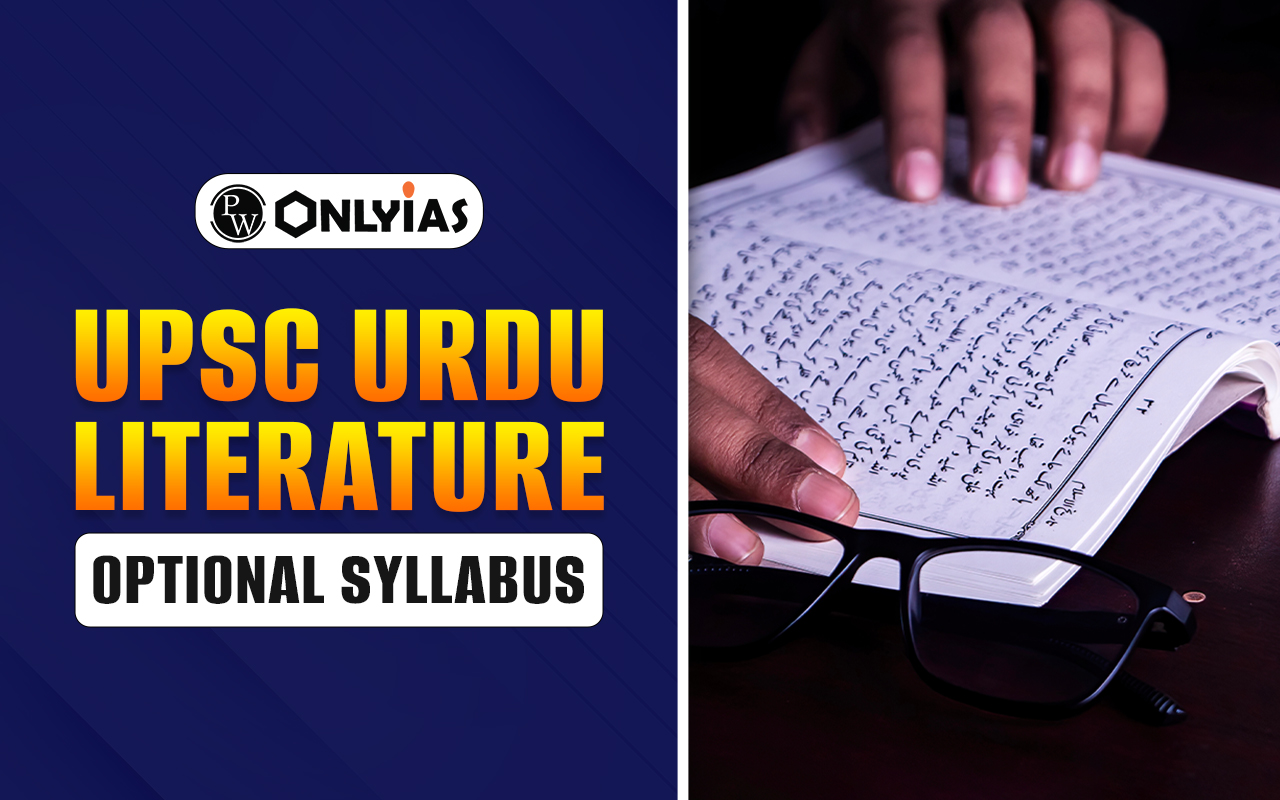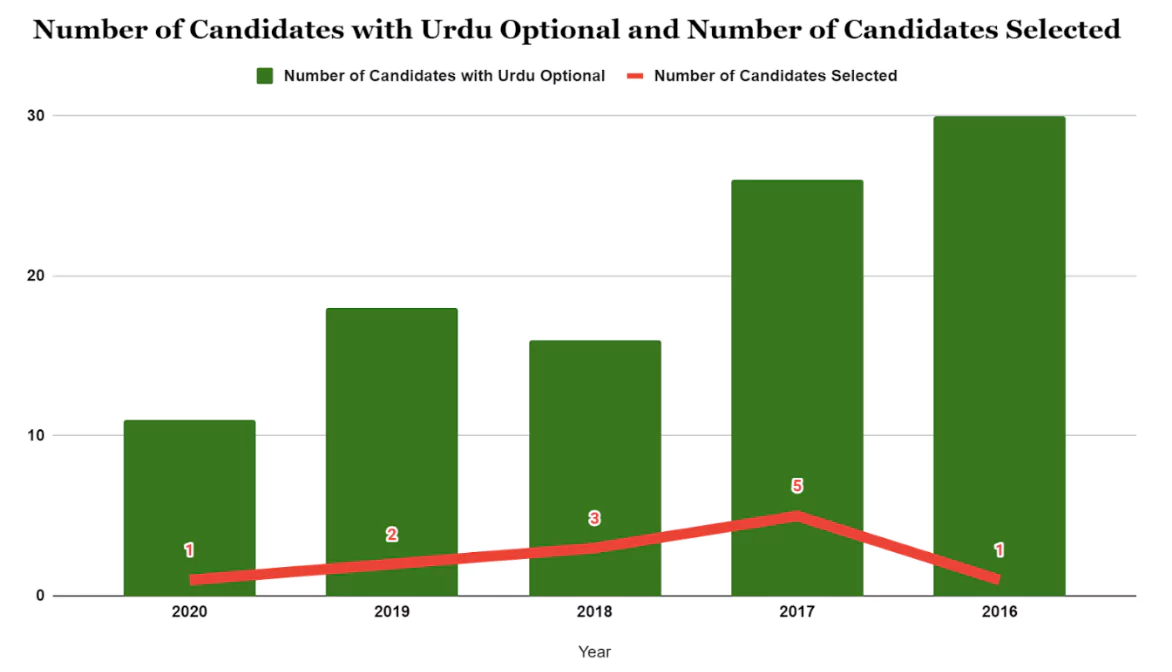UPSC Urdu Literature Optional 2026 covers classical and modern Urdu poetry, prose, drama, and literary criticism. Paper I focuses on language and literary history, while Paper II emphasizes prescribed texts. PDF download helps aspirants prepare effectively for UPSC Mains.

Urdu literature Optional is listed as one of the optional subjects for the UPSC exam in UPSC optional subject list. It’s mentioned in the UPSC notification under the category of language and literature choices. Many people choose Urdu literature as their optional subject. It’s one of the 23 languages you can choose from for this exam.
Candidates who have genuine interest in Urdu literature and are familiar with the Urdu language and its cultural context, will opt for this subject, which will make studying and preparing for the exam more enjoyable and motivating. In this article, we will try to look closely at Urdu literature from all possible dimensions to help students do well and get high marks in this subject.
Urdu language has a rich and diverse history. It reflects the evolution of Indo-Aryan languages through Old, Middle, and New phases. Urdu originated from Western Hindi and its dialects, like Brij Bhasha and Khadi Boli. Dakhani Urdu, which originated in the Deccan region, adds unique linguistic features to the language. It is one of the officials’ languages recognised under the Constitution of India,
The development of Urdu literature spans various genres, including poetry such as Ghazal and Masnavi and prose like the Novel, shaped by schools of thought like those of Delhi and Lucknow. It has also been impacted by movements such as the Sir Syed movement and the Progressive movement. Literary criticism, along with essay writing, further enriches Urdu literature, showcasing its versatility and depth.
Eminent literary works by renowned figures like Mir, Ghalib, Prem Chand, and Iqbal continue to resonate with audiences, highlighting Urdu’s enduring legacy in the world of literature.
The Urdu Literature optional subject in the UPSC mains exam covers the rich literary tradition of Urdu language. It covers the study of classical and modern Urdu poetry, prose, drama, and literary criticism. Candidates opting for Urdu Literature need to have a deep understanding of Urdu literature’s historical context, major literary movements, prominent writers, and their works. They are expected to analyze and interpret literary texts critically. This optional subject offers candidates an opportunity to explore the cultural and artistic heritage of Urdu literature while enhancing their analytical and writing skills for the UPSC exam.
Like all other optional subjects in UPSC optional subject list, the subject is made up of two papers, Paper I and Paper II, each carrying 250 marks. Each paper is divided into two sections. Each paper has a total of eight questions, divided equally into four questions.
Candidates have to attempt any five questions. Question 1 and Question 5 are compulsory. Out of the remaining six, any three have to be attempted, with at least one from each section. Answers must be written in Urdu only.
UPSC Urdu Literature Optional Exam Pattern |
|
| Particular | Details |
| Total Papers | Two papers, Paper I and Paper II |
| Total Marks | 500 (250 Each) |
| Time allowed | 3 Hours for each paper |
| Sections | Section A and Section B |
| Questions | total 8 questions with subparts |
| Compulsory Question | Question Nos. 1 and 5 |
| Marks Distribution | 10, 15, and 20 marker questions |
The UPSC Urdu Literature optional syllabus covers a wide range of topics, including classical and modern Urdu poetry, prose, drama, and literary criticism. Candidates are required to study the works of renowned Urdu writers such as Mir Taqi Mir, Mirza Ghalib, Allama Iqbal, Saadat Hasan Manto, and Ismat Chughtai, among others. The syllabus also includes the study of literary movements like Romanticism, Realism, and Modernism in Urdu literature. Additionally, candidates are expected to have a thorough understanding of Urdu literary criticism and literary theories. By studying it well, candidates can achieve maximum marks in this exam. The syllabus of Urdu literature is divided into two segments, i.e., Paper I and Paper II.
| UPSC Urdu Literature Optional Syllabus | |
| Urdu Literature Optional Syllabus Papers | Topics |
| UPSC Urdu Literature Syllabus Paper 1 |
|
| UPSC Urdu Literature Syllabus Paper 2 |
|
The UPSC Urdu Literature Optional Paper I syllabus includes the study of classical Urdu poetry, prose, and literary criticism. Candidates will explore the works of renowned poets such as Mir Taqi Mir, Mirza Ghalib, and Allama Iqbal, analyzing their poetic styles, themes, and contributions to Urdu literature. syllabus covers classical Urdu prose, including essays, biographies, and travelogues, along with the study of prominent Urdu critics and their literary theories. This paper aims to provide candidates with a strong foundation in classical Urdu literature, enhancing their analytical and interpretative skills for the UPSC exam. Answers must be written in Urdu.
Paper I Syllabus
| Section A | |
|
|
| Section B | |
|
The UPSC Urdu Literature Optional Paper II syllabus focuses on modern Urdu literature, including poetry, prose, and drama. Candidates will study the works of prominent modern Urdu writers such as Saadat Hasan Manto, Ismat Chughtai, Faiz Ahmed Faiz, and Intizar Hussain, among others. The syllabus covers major literary movements like Progressive Writers’ Movement and Post-Independence Urdu literature, along with modern Urdu literary criticism and theories.
This paper aims to provide candidates with a comprehensive understanding of modern Urdu literature’s themes, styles, and socio-political context, preparing them to critically analyze and interpret contemporary Urdu literary texts for the UPSC exam. Find the detailed syllabus below.
Paper II Syllabus
| Section A | |
|
Bagho-Babar |
|
Intikhab-e-Khutoot-e Ghalib |
|
Nairang-e-Khayal |
|
Godan |
|
Apne Dukh Mujhe Dedo |
|
Ghubar-e-Khatir |
| Section B | |
|
Intikhab-e-Kalam-e-Mir (Ed. Abdul Haq.) |
|
Sahrul Bayan |
|
Diwan-e-Ghalib |
|
Bal-e-Jibrail |
|
Gul-e-Naghma |
|
Dast-e-Saba |
|
Bint-e-Lamhat |
The UPSC Urdu Literature Optional Syllabus 2026 contains two papers for the Civil Services Mains: Paper‑I on the development of the Urdu language, genres, literary movements, and criticism, and Paper‑II on critical study of prescribed Urdu texts and authors. Aspirants can download the syllabus PDF to prepare effectively for this optional subject.
It is advisable for candidates to choose books wisely from a wide range of options to score good marks in UPSC Urdu literature optional exam in IAS exam. The right books will help them cover all the topics easily and gain a better and more in-depth understanding of the exam sections. To ensure the best preparation, candidates can refer to the Urdu literature books and other subject-specific books mentioned below to score high marks in the exam.
Optional subjects in UPSC are numerous, and each subject has its own domain. That is why each subject has its own advantages and disadvantages, depending on the interest and background of candidates. Still, we try to find out some advantages and disadvantages of Urdu Optional subjects.
| Advantages | Disadvantages |
|
|
UPSC Urdu Optional Question Papers from 2019 to 2025 are readily available for aspirants seeking to enhance their preparation. We provide access to the UPSC Urdu optional question papers in PDF format, an invaluable resource for your preparation.
UPSC Urdu Optional Previous Year Question Papers |
|
| Year | UPSC Urdu Optional Question Papers PDF Link |
| 2025 | UPSC Urdu Optional Paper 1 |
| 2024 | UPSC Urdu Optional Paper 1 |
| 2023 | UPSC Urdu Optional Paper 1 |
| 2022 | UPSC Urdu Optional Paper 1 |
| 2021 | UPSC Urdu Optional Paper 1 |
| 2020 | UPSC Urdu Optional Paper 1 |
| 2019 | UPSC Urdu Optional Paper 1 |
The table below offers a comprehensive overview of the success rate achieved by candidates who opted for Urdu throughout the year.
| UPSC Urdu Optional Success Rate | |||
| Year | Number of Candidates with Urdu Optional | Number of Candidates Selected | Success Rate (%) |
| 2020 | 11 | 1 | 9.1% |
| 2019 | 18 | 2 | 11.1% |
| 2018 | 16 | 3 | 18.8% |
| 2017 | 26 | 5 | 19.2% |
| 2016 | 30 | 1 | 3.3% |

| Year | Name | Rank |
| 2020 | Khan Aasim | 558 |
| 2018 | Gauhar Hasan | 137 |
| 2017 | Fazlu Haseeb | 36 |
| 2017 | Mohd Nooh Siddiqui | 326 |
Getting a good score in the UPSC exam for Urdu literature needs careful planning and doing things step by step. It’s important to get help from different places to do well in the exam. If you’re getting ready for the Urdu literature part of the exam, you can do better by following these steps:
Answer Sheets of the toppers who have given mock tests for Urdu Literature Optional can help candidates get familiar with the writing style and flow of the answer that UPSC demands and can excel in this exam. The topper marksheet can be easily available to various blogs and telegram groups, where candidates can avail themselves of it and analyse it.
Preparing for any optional subject is not enough without planning. If candidates are willing to choose Urdu Literature as their optional subject, then they need to have a plan for both General Studies and Urdu Literature separately. This is because for literature, candidates need to practice writing in the language script. Also, candidates can look at previous successful candidates’ notes and watch their strategy videos to make their own plan for handling the challenges.
| Must Read | |
| NCERT Notes For UPSC | UPSC Daily Current Affairs |
| UPSC Blogs | UPSC Daily Editorials |
| Daily Current Affairs Quiz | Daily Main Answer Writing |
| UPSC Mains Previous Year Papers | UPSC Test Series |
Check Out UPSC CSE Books
Visit PW Store
Urdu can be a good optional subject for the UPSC exam for candidates who have a strong command of the language or have studied it extensively. It offers an opportunity to express their knowledge and expertise in Urdu literature and language.
The Urdu Optional Paper is designed to evaluate a candidate's knowledge of Urdu literature, including specific texts, literary movements, and critical perspectives. It often includes questions that assess a candidate's analytical and interpretive abilities in the context of Urdu literature.
The UPSC essay paper needs to be written in either Urdu or any of the scheduled languages mentioned in the Eighth Schedule of the Constitution of India. Urdu is one of the scheduled languages, so it is allowed for the essay paper.
No, Urdu Paper 1 and Urdu Compulsory Papers are not the same in the UPSC exam. Urdu Paper 1 typically refers to the optional subject paper where candidates can choose Urdu literature as their optional subject. On the other hand, Urdu Compulsory Papers usually refer to the language papers that are compulsory for all candidates, which include the Urdu language paper along with papers for Urdu and other Indian languages.
It depends, Candidates with non Urdu background can find it very challenging to opt this subject.
It's advisable to choose a literature optional subject for UPSC if you've extensively studied it during your college years. This is because the preparation involves reading a significant amount of material. Additionally, finding coaching resources for these optional subjects might be limited, so prior familiarity with the subject can be beneficial.
<div class="new-fform">
</div>